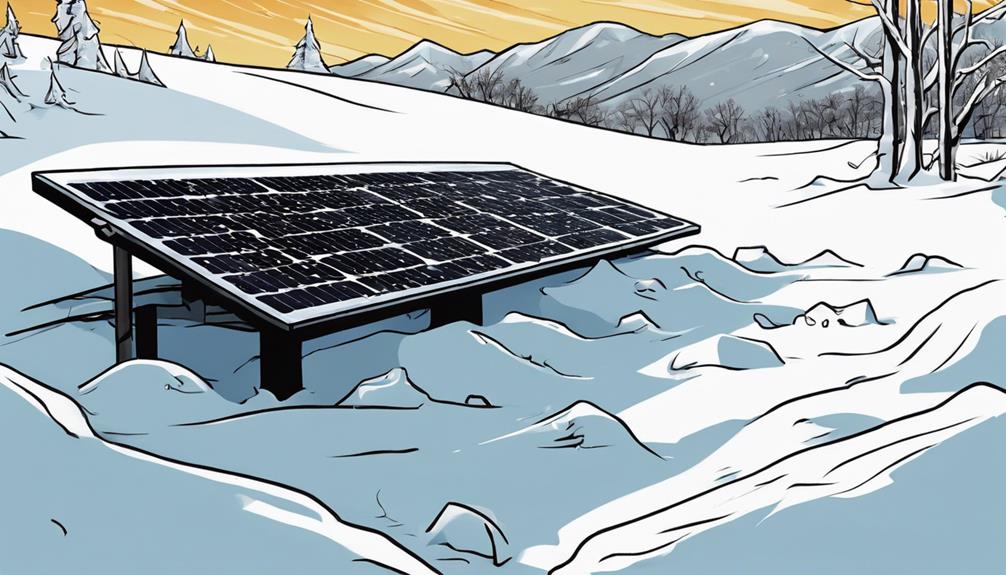When using solar energy, bear in mind its susceptibility to weather conditions and intermittency. Cloud cover and adverse weather can reduce sunlight availability, affecting energy production. Fluctuations in output due to intermittent sunlight pose challenges. To guarantee consistent power, you'll need backup energy sources and storage solutions. Remember, understanding these obstacles can help you make informed decisions about solar energy.
Key Takeaways
- Solar energy is weather-dependent.
- Intermittent sunlight causes energy fluctuations.
- Cloudy days reduce energy production.
- Backup systems are necessary for continuity.
- Adverse weather impacts solar panel effectiveness.
Solar Energy Intermittency
Solar energy intermittency poses a significant challenge for reliable energy production due to factors like weather conditions and time of day. The intermittent nature of solar energy results in fluctuations in energy production, impacting its reliability as a primary energy source.
Cloudy days, night time, and seasonal changes can reduce the amount of sunlight available for solar energy generation, leading to periods of low or no energy output. To address this intermittency, backup energy sources or energy storage solutions are essential to guarantee a continuous power supply.
Energy storage systems, such as batteries, play a vital role in mitigating the effects of solar energy intermittency by storing excess energy generated during peak sunlight hours for use when sunlight isn't available.
Despite these challenges, advancements in technology and grid integration are continuously improving the integration of solar energy into the existing energy infrastructure, helping to overcome the limitations posed by its intermittency.
Weather Dependency in Solar Energy

Weather dependency in solar energy can pose challenges to the efficiency and reliability of solar power systems. Factors like cloud cover and seasonal changes can affect the amount of sunlight available for energy production, leading to fluctuations in power output.
These weather-related constraints underscore the need for backup sources or energy storage solutions to guarantee consistent energy supply.
Weather Impact on Efficiency
During adverse weather conditions, the effectiveness of solar energy systems may be greatly impacted by factors such as cloud cover, rain, and snow. Cloudy days can significantly reduce the amount of sunlight reaching solar panels, affecting energy production and leading to lower energy output.
Likewise, rain and snow can obstruct sunlight, further decreasing the effectiveness of solar panels. At nighttime, solar panels can't convert sunlight into electricity, necessitating the use of alternative energy sources or energy storage solutions.
Additionally, weather variability can cause fluctuations in energy production, making solar energy less reliable in certain climates or seasons. These weather-related challenges highlight the dependency of solar energy on consistent sunlight exposure for peak performance, underscoring the importance of considering weather patterns when relying on solar power as a primary energy source.
Solar Energy Reliability Constraints
Efficiency in harnessing solar energy is greatly impacted by its reliance on consistent sunlight exposure. Solar energy's reliability faces constraints due to its weather dependency. The efficiency decreases on cloudy days, and energy collection becomes impossible at night.
Factors such as latitude, cloud cover, and nighttime hours limit the availability of sunlight for solar energy production. To combat the intermittent nature of sunlight, large solar arrays are often necessary to power buildings. Mechanical orientation systems and costly batteries are required to store excess energy and ensure a continuous power supply.
Additionally, solar panels are susceptible to deterioration from UV radiation, weather exposure, and other environmental hazards, further affecting their reliability. These reliability constraints emphasize the challenges associated with relying solely on solar energy and the need for innovative solutions to enhance its effectiveness in varying weather conditions.
Solar Energy Generation Variability
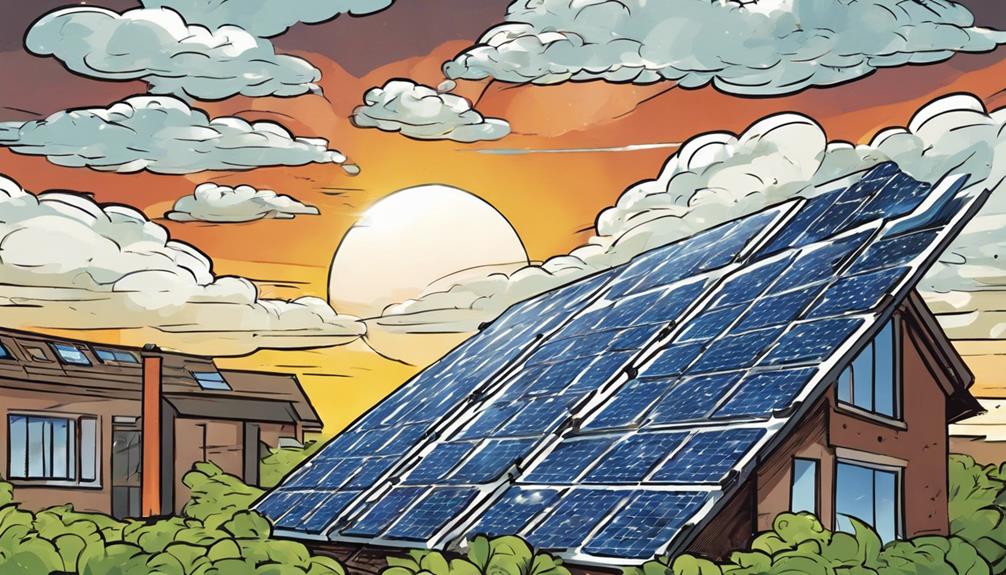
Solar energy generation variability poses a key challenge due to the intermittent nature of sunlight and its impact on power output. The fluctuations in solar power output throughout the day, influenced by factors like low sunlight intensity and weather conditions, can hinder the ability of solar panels to consistently meet energy demands. Dependence on sunlight for generating electricity raises concerns about providing a continuous power supply, especially when faced with varying weather patterns.
| Solar Energy Generation Variability | |
|---|---|
| Intermittent Nature of Sunlight | Fluctuations in Solar Power Output |
| Low Sunlight Intensity | Energy Storage Solutions |
| Dependence on Sunlight | Meeting Energy Demands |
To address the challenges posed by solar energy generation variability, the development of efficient energy storage solutions is pivotal. These solutions can store excess energy produced during peak sunlight hours for later use when sunlight is insufficient. By integrating such technologies, the goal of ensuring a more consistent and reliable renewable energy source becomes more achievable.
Impact of Weather on Solar Power
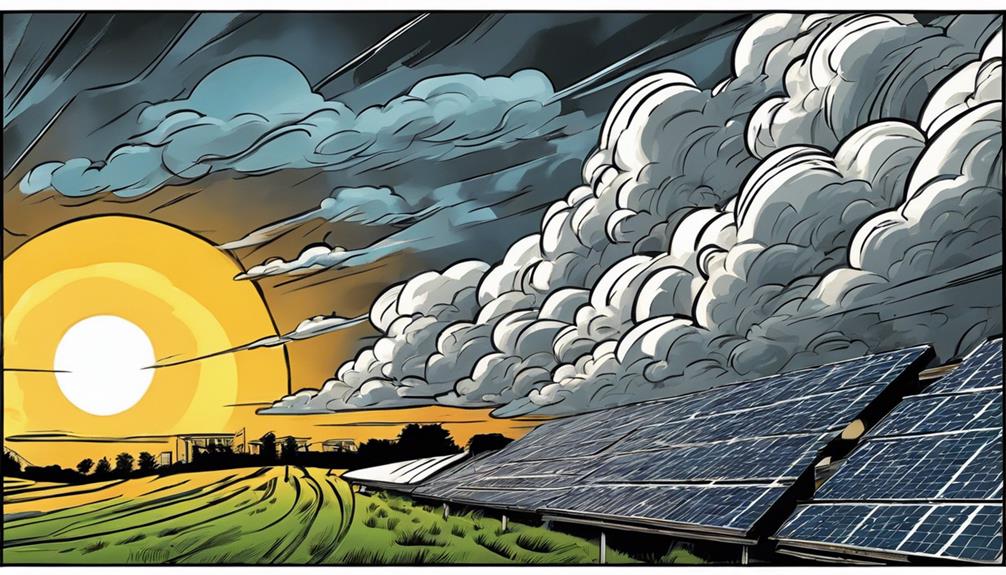
Weather plays an important role in the efficiency of solar power generation. Cloudy days, rain, and darkness can greatly reduce the amount of electricity produced by solar panels.
It's essential to take into account how varying weather conditions can impact the reliability and output of your solar energy system.
Weather's Effect on Solar
Adverse weather conditions like clouds, rain, and snow can significantly impact the performance of solar energy systems. When faced with cloudy days or extended periods of inclement weather, solar panels may experience reduced energy production and efficiency due to limited sunlight reaching the panels.
Additionally, heavy snowfall poses a challenge by covering solar panels, hindering them from absorbing sunlight effectively and thus decreasing energy output. Rain can also hinder the amount of sunlight that reaches the panels, further affecting energy generation.
Extreme weather events such as storms or hurricanes can cause damage to solar panel installations, resulting in a decline in their overall performance. It's crucial to take into account these weather-related factors when utilizing solar energy systems to optimize energy production and efficiency despite potential interruptions caused by varying weather conditions.
Solar Power and Weather
During inclement conditions, the efficiency of solar power systems may be greatly reduced due to factors like clouds, rain, and snow impacting energy production. Cloudy days and inclement weather can lower the efficiency of solar power generation by limiting the amount of sunlight reaching solar panels, decreasing energy output.
This dependency on sunlight means that during nighttime, solar panels don't generate electricity, requiring energy storage systems or alternative power sources for continuous energy supply. Weather fluctuations can introduce variability in solar energy production, highlighting the need for backup systems or grid connections to ensure reliable power during adverse conditions.
Extreme weather events like hurricanes or heavy snow can also pose a threat to solar panels, potentially damaging them and disrupting energy generation, necessitating repairs or replacements to maintain consistent energy production.
Consistency Challenges in Solar Energy
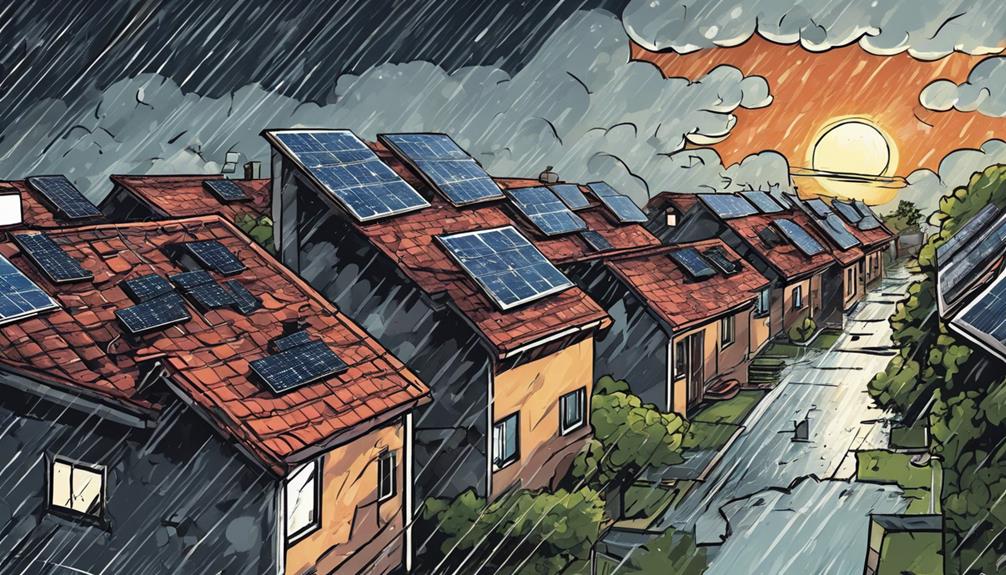
How do consistency challenges in solar energy impact its reliability and efficiency?
Inconsistent solar energy output due to factors like intermittent sunlight, weather conditions, and seasonal changes can pose challenges for maintaining a steady and efficient energy production.
Here are some key points to keep in mind:
- Dependence on Availability of Sunlight: Solar energy generation relies heavily on the availability of sunlight, making it vulnerable to fluctuations in energy production based on factors like cloud cover and clear skies.
- Impact of Intermittent Sunlight: The intermittent nature of sunlight can affect the efficiency of solar panels and overall energy output, leading to inconsistent power generation.
- Need for Energy Storage Solutions: To overcome fluctuations in energy production, energy storage solutions like batteries are essential to guarantee a continuous power supply even during periods of low sunlight.
Addressing these challenges is vital to enhancing the reliability and efficiency of solar energy systems, especially in areas prone to inconsistent sunlight and weather patterns.
Reliability Issues With Solar Power
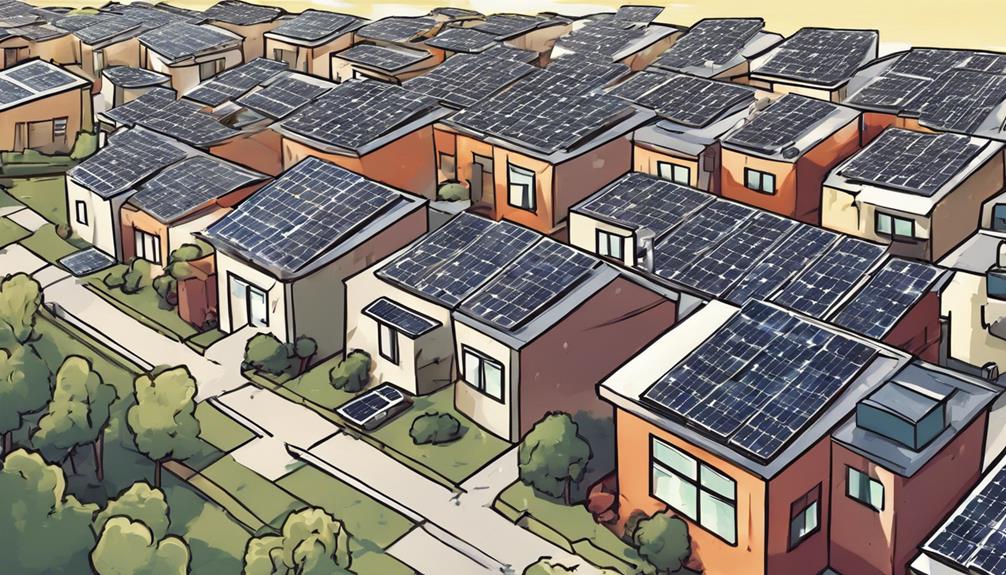
Solar power's reliability can be compromised due to various factors such as weather conditions, cloud cover, and nighttime hours. The intermittent nature of sunlight can result in fluctuations in energy production from solar panels, impacting the continuous energy generation.
To address reliability issues, solar energy systems may require backup power sources or energy storage solutions for consistent electricity supply when sunlight availability is limited. Dependence on the sun's presence can pose challenges in ensuring a reliable energy setup, especially during adverse weather conditions or at night.
Incorporating energy storage systems like batteries can help mitigate the intermittency of solar power; however, these solutions can be costly and add to the overall expenses of a solar energy setup. Balancing the need for continuous energy generation with the unpredictable nature of sunlight is a key consideration when addressing reliability issues with solar power.
Frequently Asked Questions
What Is One of the Disadvantages of Solar Energy?
When considering solar energy, one disadvantage is its intermittent production due to weather conditions. This may lead to fluctuations in energy generation. It's important to weigh this factor before making a decision on solar power.
What Is One Disadvantage of Using Solar Energy Brainly?
When considering solar energy, one disadvantage to keep in mind is its dependency on weather conditions for consistent energy production. This can lead to fluctuations in power generation, impacting your energy supply reliability.
What Are 10 Disadvantages of Solar Energy for Kids?
When considering the disadvantages of solar energy for kids, it's crucial to consider factors such as limited power availability at night, high installation costs, space requirements, weather impact on efficiency, and the expense of energy storage solutions.
What Is a Disadvantage of Solar Energy Quizlet?
When using solar energy, remember that high initial costs might be a concern. Yet, the benefits, like clean energy and long-term savings, outweigh this disadvantage. Solar energy can power your home sustainably and economically.
Is One Disadvantage of Using Solar Energy the Cost of Installation and Maintenance?
Yes, the cost of installation and maintenance can be considered one of the disadvantages of using solar energy. However, the long-term advantages of solar energy, such as reducing energy bills and lowering environmental impact, often outweigh the initial investment.
Conclusion
So, while solar energy is a great renewable option, one disadvantage you may face is its intermittency due to weather dependency. Like a sunny day that suddenly turns stormy, the inconsistency of solar power generation can pose challenges for reliability.
But don't fret, advancements in technology are helping to mitigate these issues, making solar energy a more viable and reliable option for the future.
